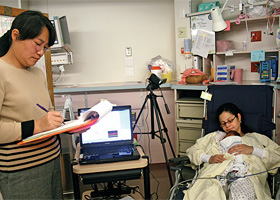Feature Story
Health Center Today, August 17, 2010
Pain Management for Preemies
By Thomas Long

UConn School of Nursing Associate Professor Xiaomei Cong collects data at the Health Center for her research studying the effect of Kangaroo Care on pain levels of babies born prematurely.
Photo by Barbara Slater
UConn School of Nursing Associate Professor Xiaomei Cong is blazing a new path in the study of pain management with premature babies, studying the effects of a natural, non-pharmaceutical remedy known as Kangaroo Care.
Also called skin-to-skin contact, Kangaroo Care is the upright prone positioning of the diaper-clad infant skin-to-skin and chest-to-chest between the mother’s breasts. It is a promising non-pharmacologic intervention for reducing procedural pain in preterm infants that has been used successfully for many years in the Health Center’s Neonatal Intensive Care Unit (NICU).
Cong hopes to show that preterm infants in Kangaroo Care experience less pain when stressful procedures, such as a heel stick, are needed. She examines the infant’s responses, including crying, facial expressions, heart rate variability, and oxygen saturation, to determine the most effective duration of holding in Kangaroo Care for maximum pain reduction in younger preterm infants. If a short duration of Kangaroo Care, such as 15 minutes, can significantly reduce infant pain, then neonatal intensive care units (NICUs) may be more likely to use this simple intervention to reduce pain.
"Kangaroo care has been encouraged in our NICU for many years. We’ve clearly seen babies respond positively and it is a wonderful way to engage parents in the care-giving process," said Gwyn Muscillo, R.N., of the Health Center.
Nationally, the preterm birth rate has climbed more than 20 percent since 1990, to 12.8 percent of all births. The survival population of “preemies” has also risen steadily because of advanced neonatal knowledge and technology. As a result, preterm infants usually spend some time in a NICU.
While in the high-tech NICU, they live in a developmentally inappropriate environment and undergo numerous painful, invasive procedures, often over a period of many weeks.
Premature infants, Cong explains, are subjected to an average of 10 to 16 painful invasive procedures per day during their NICU stay, with repeated heel sticks accounting for between 55 percent and 86 percent of these procedures.
Exposure to the procedures without pain reduction interventions has serious and lasting implications for the infant’s development. Published research documents that unrelieved pain caused by heel sticks is associated with detrimental outcomes in all major organ systems. It can have long-term cumulative effects, such as increased sensitivity to pain and stress, and impaired brain development. It can even be life threatening.
Cong began her education in her homeland, China, where in the period between the Communist Revolution of 1949 and 1985, nursing was relegated to inferior status, with preference given to physicians. During this historical period, nurses could only earn diplomas and they were taught by physicians.
She graduated from the second class in a Chinese nursing bachelor of science program. She immediately entered both clinical and classroom roles as practitioner and as nursing instructor, and began translating English-language nursing textbooks into Chinese. In the absence of a master’s degree program in nursing in China, she earned her master’s in Thailand and came to the U.S. for her doctorate.
While studying for her master’s, she discovered the literature about infant pain, which generally had been ignored, based on the false assumption that infants’ experience of pain was fleeting and inconsequential.
Cong says that traditional Chinese medicine (including herbs and acupuncture), with its emphasis on the whole person and the whole system, has informed both her clinical practice and research.
In her clinical research, Cong studies only mother-infant pairs, but she notes that fathers, too, can provide Kangaroo Care. She says the positive effects of this type of care may be related to multiple sensory modes, including the caregiver’s rhythmic breathing, heartbeat, voice, and even fragrance.
Some clinicians express concern for the parent’s feelings when holding an infant undergoing the painful procedure of heel sticks, but parents are often grateful for the opportunity to console their infants. In the high-tech neonatal intensive care unit, Kangaroo Care allows parents to contribute to their babies’ care.
Cong says Kangaroo Care helps the parents become involved with their NICU babies. “Research shows that parents feel detached, but they would like to be involved,” she says. “If I can show how Kangaroo Care helps with pain management, this gives parents the chance to prevent unnecessary infant pain.”


